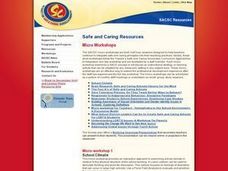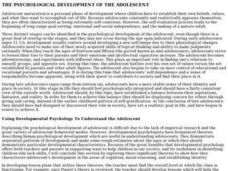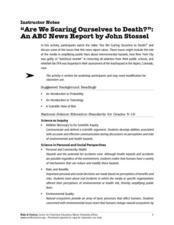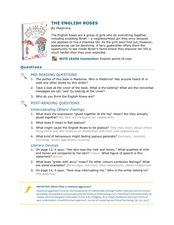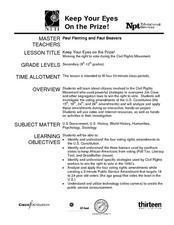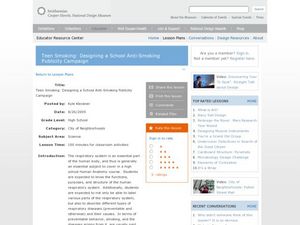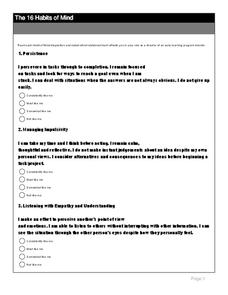American Psychological Association
Using Psychological Perspectives to Answer Questions on Behavior
Perspective is everything when it comes to assessing human behavior. Class members examine a series of statements and identify the perspective represented by each to demonstrate their understanding of different psychological perspectives.
Maryland Department of Education
The Concept of Identity Lesson 4: The Psychological Approach
Readers apply Sigmund Freud's theories of the unconscious mind and the psychological approach to literary criticism to analyze and evaluate the relationship between two characters in A Separate Peace.
American Psychological Association
Statistical Significance
Our survey says ...! High school psychology scholars analyze how people create surveys. Three different scenarios help them discover the meaning behind statistical significance. Armed with new knowledge, novice psychologists uncover what...
Curated OER
School Climate
Students examine school climate in relation to the physical structure of the school building. A Luann cartoon can be used to stimulate thinking and promote discussion which focuses on feelings of alienation that can occur in large high...
Curated OER
Identifying Bullies
Young scholars investigate human behavior by defining bullies. In this psychology lesson, students read the book Just One Flick of a Finger, and discuss why bullies act out in front of other children. Young scholars investigate actions...
Social Media Toolbox
Cyberbullying
What can we do to make our school community more aware of cyberbullying? From The Social Media Toolbox, instructional activity 10 of 16 takes on the tough topic of bullying. Learners research cyberbullying through online research, then...
Curated OER
The Physiological and Psychological Development of the Adolescent
Students examine the life of a teenager from their own perspective and an adult's. In groups, they focus on the biological changes and how they are different in a girl and a boy. Individually, they write a paper about these changes and...
Curated OER
Are We Scaring Ourselves to Death?
Interesting! Have your high schoolers watch this 13-minute clip from the documentay, "Are We Scaring Ourselves to Death?" It examines the fear we have as a culture about death and whether or not the media increases those fears. The focus...
Curated OER
The English Roses
Students explore psychology by reading a children's book in class. In this bullying lesson, students read the story The English Roses and discuss the main characters, story and setting. Students identify the moments when the main...
Curated OER
Desegregating the Kentucky Public School System
Students watch a video which chronicles the struggle to desegregate Kentucky's schools. They write a paper on a given aspect of what they saw in the video.
Curated OER
All About Me Lesson
Students explore psychology by writing about themselves. For this personality lesson, students answer a list of questions that help analyze their own traits and history. Students create a personal "All About Me" book which they share...
Curated OER
Keep Your Eye On the Prize
High schoolers learn about citizens who were actively involved in the civil rights movement, and the strategies they used to overcome the Jim Crow laws that were so prevalent in the 1960s. They investigate the voting amendments of the US...
Curated OER
The Mozart Effect
Music has been said to effect short term memory. Learners test out this hypothesis, graphing how knowledge retention in a biology classroom changes when music is played in the background. In the end, a better appreciation of the dynamics...
Curated OER
Learning To Get Along With Classmates: A Discussion of Bullying And Intimidation At School
Students discuss cliques, intimidators, support systems and how it feels to be victimized, and discuss ways to deal with hurtful people.
Foreign Policy Research Institute
The Mind of a Terrorist: A Psychosocial Perspective
What a great way to make a psychology lesson on personality development socio-politically relevant! Class members investigate causes of radicalism--specifically, becoming a terrorist. This resource includes background information, key...
Curated OER
Memory
In this psychology worksheet, students complete 5 short answer questions on processes involved in memory, forgetting and retention.
Curated OER
Lesson: Nikhil Chopra: Performing Memory
Film imitates life; that's what they say. Using performance theory to tie the lesson together, learners attempt to understand memory and daily rituals as seen in art, film, and life. They read two chapters from the book, watch the...
Curated OER
Class Reunion
Students explore the process of decision making regarding their own goals and objectives. They consider their future and preparation for life beyond high school by completing a Class Reunion sheet.
National Center for Case Study Teaching in Science
Identical Twins, Identical Fates?
Can different personal experiences affect our genes? Find out in an intriguing case study about one twin who is diagnosed with mental illness and her identical twin who fears she may suffer the same fate. Designed for college-level...
Curated OER
Rape: Psychology, Prevention and Impact
Young scholars are introduced to the characteristics of rape. As a class, they identify statements as either facts or myths about rape. In groups, they complete a survey to identify their own perceptions about rape and compare them...
Curated OER
Teen Smoking: Designing a School Anti-Smoking Publicity Campaign
Students review the human respiratory system and the effects on the human body. In this design lesson plan students brainstorm and create a prototype then present it to the class.
American Psychological Association
Research Ethics
Psychologists designing experiments to research human behavior must consider weighty ethical concerns. Class members act as members of an institutional review board and examine proposals to determine whether included provisions...
American Psychological Association
Counting Fidgets: Teaching the Complexity of Naturalistic Observation
Why do psychologists conduct experiments in controlled laboratory settings? High schoolers gain an understanding of the importance of controls with an activity that involves naturalistic observations with no imposed controls.
Center School
The 16 Habits of Mind
Which of Costa's 16 Habit of Mind best describes you? Take a short assessment to see which quality is most consistently like you, or which quality is not like you at all.
Other popular searches
- High School Psychology
- School Psychology Motivation
- School Psychology Freud
- School Psychology Worksheets
- School Psychology Memory
- School Psychology Aggression
- School Psychology Learning
- High School Psychology Brain
- School Psychology Agression
- School Psychology Freud Id
- %2522 School Psychology





